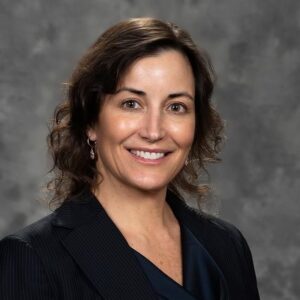Advancing Women’s Health: Insights from the NASEM Women’s Health Report

Angeles Alvarez Secord, MD, MHSc
Angeles Alvarez Secord, MD, MHSc, SGO past president and current SGO board member, served on the National Academies of Sciences, Engineering, and Medicine (NASEM) Assessment of NIH Research on Women’s Health committee and helped shape the newly released report, A New Vision for Women’s Health Research: Transformative Change at the National Institutes of Health. This landmark report sheds light on systemic issues in women’s health research, including funding disparities and gaps in knowledge and provides recommendations for improvement.
The report highlights urgent priorities for gynecologic oncology, including research to address the alarming rise in endometrial cancer rates and stagnant survival outcomes for cervical cancer. “The needs are so great,” Dr. Secord emphasizes. “Additional high-priority areas include ovarian cancer screening, new treatments for rare gynecologic cancers, and research on surgical techniques. The goal is better and longer lives for all.”
The critical takeaways are that there are significant gaps in women’s health research and that lack of funding hampers medical experts’ ability to accelerate progress. “Only 8% of the National Institutes of Health (NIH) budget supports women’s health research,” Dr. Secord shares. “This knowledge deficit negatively impacts our ability to care for our patients.”
In addition to research funding, the report underscores the importance of workforce development. “We need to make sure we’re working to expand the workforce and training, supporting, and retaining existing investigators conducting research in women’s health,” Dr. Secord notes. To that end, the committee makes several recommendations in this area, including to:
- Create a new subcategory within the Loan Repayment Program for investigators conducting research on women’s health or sex differences
- Allow financial support of up to ten percent for mentors on all mentored grants that support careers of early and midcareer investigators in women’s health and sex differences research
- Create new and expand existing early and midcareer grant mechanisms
- Support early career mentored institutional K-awards for up to five years
- Expand the Building Interdisciplinary Research Careers in Women’s Health (BIRCWH), Summer Clinical Oncology Research Experience (SCORE), Women’s Reproductive Health Research (WRHR), and Reproductive Scientist Development Program (RSDP) programs
- Fund additional multi-project program grants
- Prioritize and promote participation of women and investigators from underrepresented communities
The committee also recommends the development of a fund for women’s health research, which would provide a mechanism, incentive, and financial means for interdisciplinary collaboration. “Many critical gaps in our knowledge – like the link between endometriosis, polycystic ovary syndrome, and gynecologic cancers – will require interdisciplinary research,” Dr. Secord explains. “This is why fostering collaboration is so vital.”
Advocacy is another key component of change. “Historically, attention to various health problems by the federal government has come from patients and advocates bringing attention to those issues,” Dr. Secord said. “The patient voice is powerful and compelling. Testimonials make it real, and people can relate.”
The NASEM report represents a critical call to action for gynecologic oncology and the health care community at large. “Women’s health research is not a political issue. It’s fundamental to ensure that our mothers, sisters, daughters, and every female have the promise of longer, healthier, and vibrant lives,” Dr. Secord shares. Though women’s health has faced significant funding and prioritization challenges, the committee is confident that improving the lives of millions of women going forward can strengthen the foundation of healthcare, creating a healthier society for everyone.
SGO, working with the Women First Research Coalition (WFRC), advocated before Congress to direct NASEM to do this important work. Moving forward, SGO, through the Health, Policy, and Socioeconomic (HPSE) Legislative Affairs Subcommittee, the WFRC, and other organizations who support increased investment in women’s health research, will work together to send a consistent message to policymakers to advance this important work in the changing political environment.